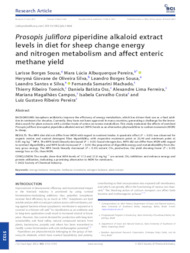Prosopis juliflora piperidine alkaloid extract levels in diet for sheep change energy and nitrogen metabolism and affect enteric methane yield.
Prosopis juliflora piperidine alkaloid extract levels in diet for sheep change energy and nitrogen metabolism and affect enteric methane yield.
Author(s): SOUSA, L. B.; PEREIRA, M. L. A.; SILVA, H. G. de O.; SOUSA, L. B.; SILVA, L. S. e; MACHADO, F. S.; TOMICH, T. R.; OSS, D. B.; FERREIRA, A. L.; CAMPOS, M. M.; COSTA, I. C.; PEREIRA, L. G. R.
Summary: BACKGROUND: Ionophore antibiotics improve the efficiency of energy metabolism, which has driven their use as a feed additive in ruminants for decades. Currently, they have not been approved in many countries, generating a challenge for the immediate search for plant extracts with a similar mode of action on rumen metabolism. This study evaluated the effects of enriched Prosopis juliflora (mesquite) piperidine alkaloid extract (MPA) levels as an alternative phytoadditive to sodium monensin (MON) in sheep. RESULTS: The MPA diet did not differ from MON with regard to nutrient intake. A quadratic effect (P < 0.05) was observed for organic matter and neutral detergent fibre digestibility, with respective maximum point at 25.40 and minimum point at 0.95 mg kg-1 MPA. The MPA levels linearly decreased (P < 0.05) faecal nitrogen loss. MPA did not differ from MON with regard to nutrient digestibility, and MPA levels increased (P < 0.05) the proportion of digestible energy and metabolizability from dietary gross energy. The MPA levels linearly decreased (P < 0.05) enteric CH4 production, the yield showing lower (P < 0.05) energy loss as CH4 than MON. CONCLUSION: The results show that MPA levels of 17.3 and 27.8 mg kg-1 are enteric CH4 inhibitors and enhance energy and protein utilization, indicating a promising alternative to MON for ruminants.
Publication year: 2022
Types of publication: Journal article
Unit: Embrapa Dairy Cattle
Keywords: Algaroba, Balanço de Energia, Extrato Vegetal, Metano, Nitrogênio, Ovino
Observation
Some of Embrapa's publications are published as ePub files. To read them, use or download one of the following free software options to your computer or mobile device. Android: Google Play Books; IOS: iBooks; Windows and Linux: Calibre.
Access other publications
Access the Agricultural Research Database (BDPA) to consult Embrapa's full library collection and records.
Visit Embrapa Bookstore to purchase books and other publications sold by Embrapa.

